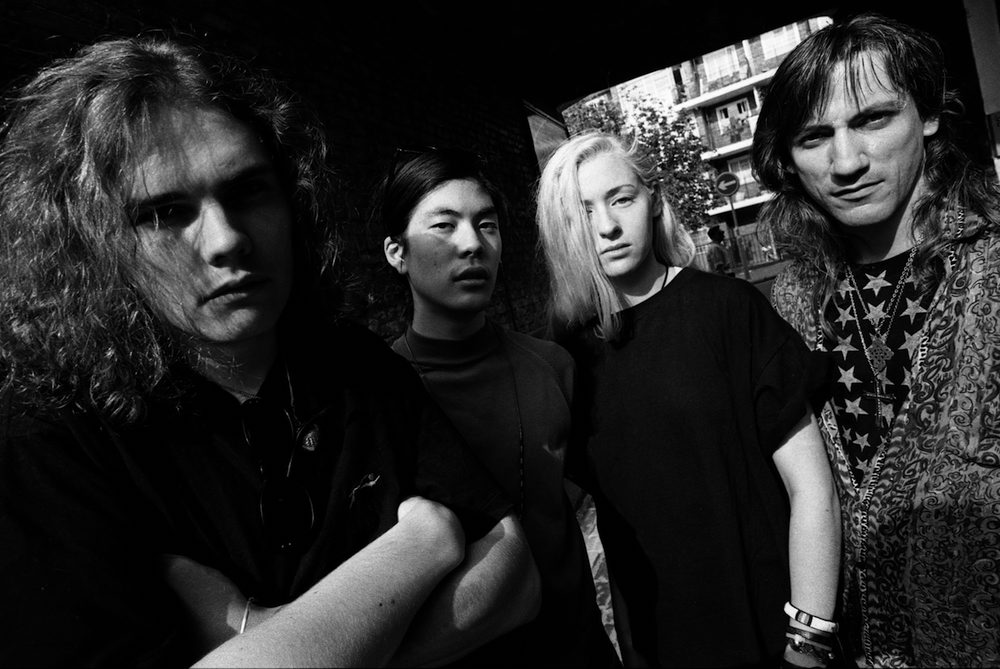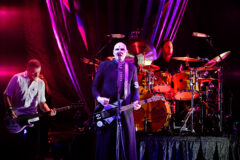If anyone felt the inevitability of the Smashing Pumpkins‘ resuscitation, it was Victoria Cecilia of Los Angeles electro-rockers Gliss. In 2005, Gliss opened for Billy Corgan on a tour promoting his solo album, TheFutureEmbrace. Outside clubs around the globe, Cecilia encountered a recurring sight: young fans in vintage Pumpkins T-shirts, tackling Siamese Dream-era material on acoustic guitars. And while Corgan insisted on playing TheFutureEmbrace’s knotty techno pop exclusively, many punters would have preferred something else entirely. “Some people were really into it, and some people weren’t,” Cecilia recalls. At one show, Corgan inserted the briefest of riffs from a Pumpkins tune into one of the new songs, and, she says, “People were screaming.”
Alt-rock nostalgia boomed in the summer of 2007, making it often feel a lot like the summer of 1997. Rage Against the Machine regrouped, as did the Jesus and Mary Chain, Alice in Chains, and the Happy Mondays. While most reunions provoke an uneasy mix of feelings – warmth and fondness on one hand, disdain and pity on the other – none matched the return of Smashing Pumpkins for sheer controversy.
Asked by Spin in 2005 whether the megaplatinum quartet would ever reunite, Corgan answered: “When people ask me that, it means, ‘Are we going to see the four band members onstage again?’…The answer…is no. There’s no way you’re going to get those four people onstage again. The divides are too deep.” A few weeks later, Corgan placed full-page ads in the Chicago Tribune and the Chicago Sun-Times announcing that he was going to “renew and revive” the Pumpkins.
Given that the group played “farewell” shows when they disbanded in 2000 – and that Corgan clearly had no interest in reuniting with guitarist James Iha and bassist D’Arcy Wretzky – what did he mean? Two years after the Spin interview, Corgan finally answered that question: Zeitgeist, the first new Pumpkins album since 2000’s Machina/The Machines of God, arrived in July. Yet, like Barry Bonds’ home-run record, this milestone arrived with a giant asterisk. From the beginning, the chrome-domed alternateur was secretive about the specifics of the comeback: Initial press releases trumpeting the CD and live gigs mentioned Corgan and longtime drummer Jimmy Chamberlin but didn’t cite any new members. It was eventually revealed that joining the tour would be three unknowns – guitarist Jeff Schroeder, bassist Ginger Reyes, and keyboardist Lisa Harriton.
Declining all interview requests, Corgan has remained mum on how he found these new players, why he was reviving the band name, or why the revamped unit’s American debut was a nine-night residency at the Orange Peel, a 942-capacity club in Asheville, North Carolina (followed by 11 nights at the Fillmore in San Francisco). Was Corgan, who led hours of rigorous rehearsals before each Asheville show, just getting Pumpkins 2.0 in shape? Or was he just hiding from the inevitable “Where are James and D’Arcy?” questions?
Then again, Iha and Wretzky weren’t talking, either. Iha has been keeping busy with his Manhattan recording studio (Stratosphere Sound) and label (Scratchie). “He’s never been contacted by Billy, so he doesn’t have anything to say about it,” says Stratosphere studio manager Debb Hanks. Since quitting the Pumpkins after being busted for crack possession (she was never charged with a crime but did attend a drug rehab program), Wretzky has led a quiet life near rural Watervliet, Michigan. Although she previously co-owned a horse farm, she currently helps her boyfriend with his business, a car wash.
In light of such a quasi reunion, though, plenty of other people were happy to sound off. One fan wrote on Stereogum, “Whatever incarnation it is…it is more than acceptable to me,” to which another poster retorted, “This reunion is a joke, and Corgan’s a twat.” At least one fellow superstar musician was wary as well: Backstage at Live Earth in New Jersey, where both the Pumpkins and the Police played, Andy Summers was overheard saying to a friend, “Oh, they’re just awful – and they’re not playing anything.”
And then, the curious retail strategy: The versions of Zeitgeist sold by Target, Best Buy, and iTunes each feature a different exclusive track, meaning fans have to buy three full albums to get all the new material. “We’re upset,” says Rob Roth of Vintage Vinyl in Fords, New Jersey. “Without indie stores, the Smashing Pumpkins wouldn’t even be on anyone’s radar. And Billy pays us back by saying, ‘Fuck you.’”
Yet these recent moves shouldn’t have shocked anyone. The Pumpkins have always been Corgan’s ship – especially since 1995, when he trademarked the name. According to Butch Vig, who produced 1991’s Gish and 1993’s Siamese Dream, Iha and Wretzky provided “emotional support” more than musical chops in the studio. “Billy was very much in control,” he says. “At points, he just realized he could play [the guitar] or bass parts better, which ended up happening on 90 percent of both records. There are bits of D’Arcy and James here and there, but for the most part, Billy played almost everything.” (For Zeitgeist, Corgan handled all the instruments except drums.) Although Vig hasn’t spoken with Corgan in several years, he understands the frontman’s current motivation: “When he said he wanted to get the band back together, I think it’s a mentality…in terms of how he’s going to write, regardless of who works with him. It’s, ‘This is the kind of music the Pumpkins do.’”
Given the run of sold-out gigs, plenty of fans agree; as Josh Keller, 27, put it before one show: “Corgan is pretty much the heart and soul” of the band. More telling was the way the Pumpkins were welcomed back by an industry desperate for superstars past or present. Its first week out, Zeitgeist debuted at No. 2, selling a respectable 145,000 copies, and first single “Tarantula” cracked the Top 10 on alt-rock and mainstream-rock radio. “It’s about the name, the brand, the aura, all that stuff,” says Mike Boyle, an editor at Radio & Records magazine. So, in the end, is Billy Corgan enough? As another fan outside the Orange Peel, 20-year-old Emily Acuna, put it, “I mean, he’s enough for a $20 ticket.”





